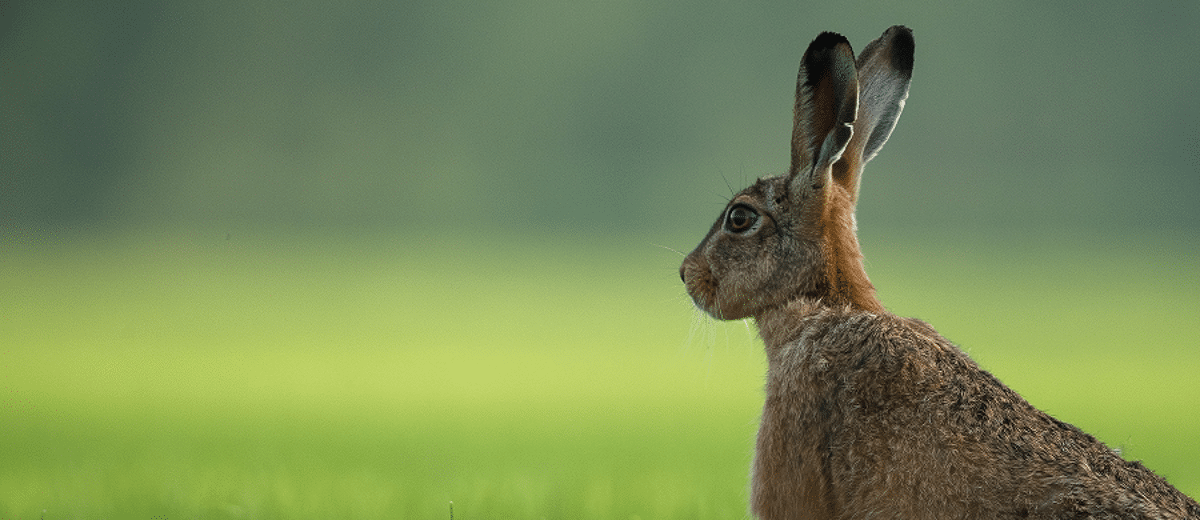Wildlife crime
From badgers living in setts beneath our feet, to populations of bats roosting above our heads, our natural wildlife is precious. Threats to these creatures, as well as to animals such as hares and birds of prey, have a detrimental impact on surrounding rural communities.
Wildlife crime covers a range of unlawful actions against our wild animals and plants, with badger persecution and bat crime among some of the UK’s current wildlife crime priorities set out by the National Wildlife Crime Unit (NWCU).
Although not limited to the countryside, rural communities are particularly vulnerable to this crime due to their abundance of natural habitats for wildlife.
Do you have information on a suspected wildlife crime and want to remain anonymous? Tell us what you know online or call 0800 555 111:

If you have information about a crime, use the free what3words app to report the exact location of the incident.
You can either copy and paste the three words into our rural crime form, or call 0800 555 111 and share them with one of our Call Agents when you are giving information anonymously.
In an emergency, always call 999 - you can also use what3words to tell the police operator exactly where to send help.
Learn more about wildlife crimes which affect rural communities:
including Illegal killings of birds of prey, hare coursing, poaching, badger baiting and bat crime
Species such as golden eagles, peregrine falcons, buzzards, red kites, hen harriers, and more are shot, poisoned and illegally trapped, with their nests and eggs frequently being disturbed.
As well as being incredibly cruel to the birds, many of which are increasingly rare in the wild, the spring traps used present potential danger to people - and the poisons used can be extremely dangerous even in very small amounts, as they can be absorbed by people through the skin.
- Dead birds of prey lying next to dead pigeons, rabbits, pheasants, or other potentially poisoned baits. DO NOT TOUCH.
- Live birds of prey caught in any trap.
- Any spring traps set out in the open that are not within a cage tunnel or other enclosed tunnel structure.
- Any spring traps set out on top of a post – known as ‘pole traps’.
If you come across a dead bird or suspicious object, this could be a wildlife crime scene. Every piece of information may be crucial in prosecuting an offender. Try not to disturb the scene; don’t touch or move anything; never approach suspects yourself as they may react violently; take photographs to act as a record if it is safe to do so.
If the crime or suspected crime is still taking place right now, call 999 immediately. If not, call 101 to report crime that does not require an emergency response, for example if the illegal killing has taken place and the suspects are no longer at the scene.
If you have information about those behind the illegal killing of birds of prey and you want to remain 100% anonymous, tell us what you know by calling 0800 555 111 or using our online form.
Find out more from the RSPB.
Hare coursing
Hare coursing is an illegal ‘blood sport’ in which coursers use trained dogs to catch and brutally kill hares, making up to £30,000 in three months of bets. If caught, the criminals behind hare coursing can incur a fine of up to £5,000, and those taking part may have their vehicles and dogs seized.
Not only is this ‘blood sport’ incredibly cruel and exploitative of wild hares, but it can also have detrimental impacts on farmers and rural residents who fall victim to hare coursers operating on their land.
As well as feeling frightened, vulnerable, and fearful of reprisals if they speak out, these communities are left to cover the cost of damaged crops and hedges, directly impacting their livelihood.
According to the NFU Mutual 2021 Rural Crime Survey, hare coursing is the most common crime experienced by farm businesses in East Anglia at 67%, demonstrating the huge scale of the problem for rural communities.
Look out for the following indicators that illegal hare coursers are operating:
- Groups of vehicles parked in a rural area, perhaps near a gateway to farmland, on a grass verge, on a farm track or bridle path – this is often the most obvious sign.
- A cluster of estate cars, four-wheel drives, or vans with evidence of dogs inside.
- Vehicles travelling in convoy, with vans at the front and rear containing minders.
- A gathering of people using binoculars to spot hares.
- Coursers walking along the edge of a field to frighten a hare into the open.
If the hare coursing is a ‘live’ incident, dial 999. If not, call 101 to report crime that does not require an emergency response, for example if hare coursing has taken place and the suspects are no longer at the scene.
If you witness hare coursing, make a note of the date, time, and exact location of the activity, along with a description of any vehicles, people, dogs, and direction of travel. This information will be most useful when reporting.
If you have information about those behind hare coursing and you want to remain 100% anonymous, tell us what you know by calling 0800 555 111 or using our online form.
The NFU offer practical guidance for preventing hare coursing from happening on your land on their Rural Crime Hub.
Poaching
Poaching commonly means the illegal killing of deer, rabbits, fish and game (hare, pheasants, partridges, grouse, heath or moor game and black game, plus ptarmigan in Scotland). It can have huge ecological and economic impacts through damage to crops, land and ecosystems, and poachers are often involved in multiple forms of rural crime.
Illegal fishing is any fishing activity that is in breach of national or local by-laws set out in England, Wales, Scotland and Northern Ireland.
These laws are in place to protect ecosystems and prevent depletion of fish stocks; breaking these poses a threat to the environment, and is often linked with anti-social behaviour.
Illegal fishing can be highly lucrative for criminals – according to World Animal Protection, a single poached carp is worth up to £12,000 on the black market. The replacement cost of stolen fish can therefore have a huge impact on rural businesses who are left out of pocket.
If you are witnessing fish poaching, dial 999. Call 101 to report a non-emergency incident after it has happened, giving details of the location, time, date, description of suspected poachers and registration numbers of vehicles being used where you can.
Poaching or illegal fishing can also be reported via the Environment Agency’s 24-hour incident hotline on 0800 80 70 60.
If you have information about those behind illegal fishing and you want to remain 100% anonymous, tell us what you know by calling 0800 555 111 or using our online form.
According to the British Deer Society, up to 50,000 deer a year are killed by poachers, who often use cruel poaching methods such as use of snares and traps, or use of dogs to attack the deer.
Organised criminals motivated by money will often trespass on private land with firearms and shoot at an unclear target. Not only does this damage agricultural assets, crops and property, but it leaves rural landowners feeling vulnerable.
Because poachers may be in possession of weapons, firearms and dogs and are likely to be operating either early in the morning or late at night, it is not advisable for landowners or members of the public to approach suspected poachers.
If you have poachers on your land and you are being threatened, or if your property is being damaged, dial 999. Otherwise, call 101 for non-emergencies, for example if you suspect deer poaching in your area, providing as much information as you can. This could include location, time, date, description of suspected poachers, and registration numbers of vehicles being used.
If you have information about those behind deer poaching and you want to remain 100% anonymous, tell us what you know by calling 0800 555 111 or using our online form.
Game poaching refers to the illegal killing of hare, pheasants, partridges, grouse, heath or moor game and black game, plus ptarmigan in Scotland.
Like with deer poaching, organised criminals may operate illegally on private land. Use of firearms can destroy property and crops, leaving rural residents and landowners fearing for their safety and out of pocket due to loss of livelihood.
Because poachers may be in possession of weapons, firearms and dogs and are likely to be operating either early in the morning or late at night, it is not advisable for landowners or members of the public to approach suspected poachers.
If you have poachers on your land and you are being threatened, or if your property is being damaged, dial 999. Otherwise, call 101 for non-emergencies, for example if you suspect game poaching in your area, providing as much information as you can. This could include location, time, date, description of suspected poachers, and registration numbers of vehicles being used.
If you have information about those behind game poaching and you want to remain 100% anonymous, tell us what you know by calling 0800 555 111 or using our online form.
Unfortunately, as landowners you can’t safely prevent this crime. But you can raise the alarm when you suspect illegal hunting or poaching.
Despite having one of the highest levels of protection in law, according to the Badger Trust 30,000 badgers fall victim to wildlife crime each year, with badger baiting accounting for over 20% of reports to the Badger Persecution Priority Group in 2019.
Not only is this ‘blood sport’ incredibly cruel for the badgers, but it can also have implications for the safety and wellbeing of those who have badger baiters acting on their land. Organised criminals will often be in possession of weapons or attack dogs which can damage property and leave rural landowners feeling vulnerable.
Look out for the following indicators that illegal badger persecution is taking place:
- People out with dogs and spades during the day, or dogs, guns and powerful lamps during the night.
- Traps, pellets or food near badger setts, as well as farm machinery or excavators.
- Badger setts appearing to be dug up with spade marks or blocked with materials.
Do not confront people who may be badger baiting if you believe that they have dogs with them, or if they may be in possession of weapons such as spades, shotguns or air weapons. You should move to a safe location and contact the police.
If you have information about those behind badger baiting and you want to remain 100% anonymous, tell us what you know by calling 0800 555 111 or using our online form. Try to provide as much information as possible, including:
- What is the location of the suspected crime?
- How many people are involved?
- What do they look like? Describe the people involved; include clothing as well as physical features such as height, weight and hair colour.
- Do they have anything with them? Often people may be carrying other items such as spades, bags, traps or lamps. This will enable you to accurately assess what they may be intending to do and where they might be heading.
- Are they carrying any sort of a weapon such as a shotgun or air weapon? Do they have a vehicle? If so, what is the make, model or registration number?
- Has this happened before?
Unfortunately, as landowners you can’t safely prevent this crime. But you can raise the alarm when you suspect badger baiting.
Bat crime - damage/destruction of roosts
Identified as one of the six areas of priority for UK wildlife crime by the NWCU, bat persecution involves disturbing, injuring or killing bats, and damaging or obstructing their roosts. According to the Bat Conservation Trust, 97% of bat crime incidents reported to the police in 2018 involved damage/destruction of roosts.
Bat roosts tend to be communal, and disturbance to one could cause local extinction of the species. Because most bat species are reliant on man-made structures for roosting, e.g. churches, barns and houses, they are vulnerable to building or development which threatens their habitat. Conducting activities that may harm bats or their habitat therefore requires a bat survey to be carried out.
Bats are valuable not only due to their role as ‘indicator species’ which can indicate changes in biodiversity, but they are useful pest controllers for keeping insects away from crops – threats to local bat populations may therefore have a knock-on effect on surrounding farmers and landowners.
The following activities are against the law – look out for those who are:
- Deliberately capturing, injuring or killing bats.
- Damaging or destroying a breeding or resting place.
- Obstructing access to their resting or sheltering places.
- Possessing, selling, controlling or transporting live or dead bats, or parts of them.
- Intentionally or recklessly disturbing a bat while it’s in a structure or place of shelter or protection.
Damage, destruction and obstruction of roosts, as well as bat disturbance, are criminal offences which can be reported to the police.
If you have information about those behind bat crime and you want to remain 100% anonymous, tell us what you know by calling 0800 555 111 or using our online form. Tell us about:
- Date, time, location, details of anyone involved.
- Registration numbers of any vehicles involved.
- If you know of a bat roost or habitat that is under threat from development, you can contact your local planning authority to find out whether a bat survey has been carried out.
- If not, those carrying out the works could be at risk of committing a crime. You can contact the council and request that a survey be completed.
- If you have seen bats emerging from buildings or trees being worked on where planning permission has been granted without a bat survey, a crime may be being committed.

Give information
Give information anonymously by phone on 0800 555 111 or online

Donate to us
Join our fight against crime by making us a donation today, and see how the money you give can help shape your community for the better.

Be a force for good & volunteer
Help make communities safer together by volunteering with your local Crimestoppers team.
